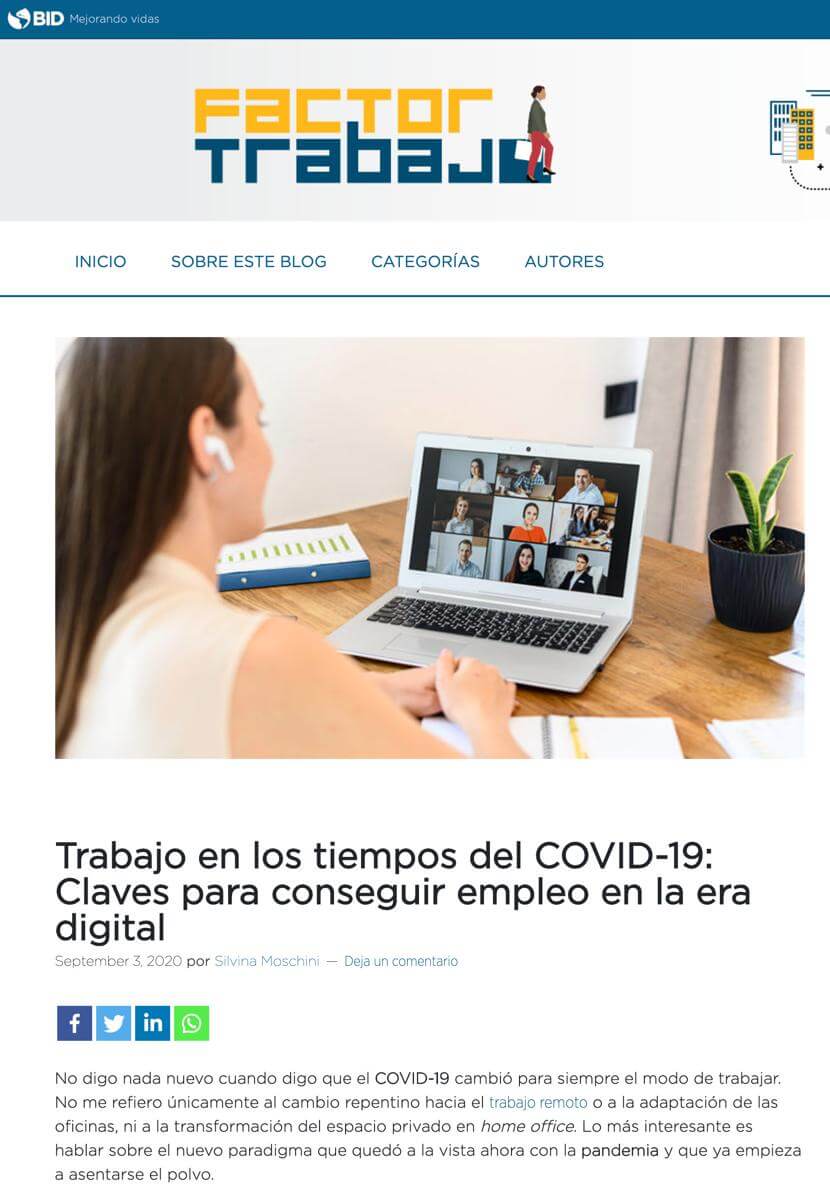We are pleased to share with you that the Inter-American Development Bank (IDB / BID), a major international bank, published an article on efficient work during the pandemic by Silvina Moschini, a co-founder, Chairwoman and President of TransparentBusiness:
Work in the days of COVID-19: Keys to getting a job in the digital age
I'm not saying anything new when I say that COVID-19 has changed the way we work forever. I am not only referring to the sudden shift towards remote work or the adaptation of offices, nor to the transformation of private space into a home office. The most interesting thing is to talk about the new paradigm that was now visible with the pandemic and that the dust is already beginning to settle.
Vertical and horizontal relationships
In a scenario where interaction is limited, trust is a basic condition for efficient work. Confidence of the leaders in the team and vice versa, but also among the employees. Supervisors who had to get used to working without the team in sight soon understood that responding with micromanaging is a mistake, as Brian Kropp, vice president of Gartner, says. The times demand accepting that work is something that is done and not a place where one goes, and that monitoring must migrate from people to processes. The lack of trust is solved with technological tools designed to plan, collaborate and follow up in real time with platforms such as Google Drive, Webex or Zoom.
Transparency
The transparency and data economy that technology enables is to say that every worker, regardless of where they are, is responsible for what they do. As a technology entrepreneur specializing in the remote team management space in what we call “Business Transparency”, I like to think that you can't manage what you can't see and what you can't measure. Using cloud technology, the company can track the work done in real time and evaluate the performance of each team member. Now leaders must design workflows flexible enough so that all employees, no matter how far apart, find their place in the organization.
Hard skills and soft skills
Digital skills and soft skills are the ticket to the new world of work. In the field of digital, I am not only talking about connectivity but about the technological aspects of this perfect storm for the digital transformation that we are experiencing: artificial intelligence, big data, the internet of things and all those skills that define work distance and pandemic proof. With regard to soft skills, these went from being a "nice detail" in human talent evaluations to being perhaps the most important and critical pillar to stay within a changing work system. Emotional intelligence, autonomy, curiosity, initiative, determination and the ability to make decisions are inescapable requirements for anyone looking to stand out and successfully navigate the new work reality, and HR departments should focus less on traditional roles and more in transversal skills.
What was hidden comes to light
Technology is a true democratizer of opportunities for everyone, but especially for women who, thanks to the digital transformation, can manage their careers from wherever they are and balance their work and personal life. The only current competition is talent. And this is also key for the incorporation of young people, older adults and people with different capacities in the world of work. Remote work closes all the gaps thanks to its flexible hours, democratic access to the same opportunities, and equal training and pay based on skills and not on gender, age or any other limiting bias.
What was transitory becomes permanent
COVID-19 shook the world of work. In these dramatic months, many lost their jobs and others found it necessary to find ways to diversify their income. On the other hand, organizations went out to hire people to assist in the transition to remote work: new needs, new resources. 32% of organizations are replacing their full-time employees with contingent workers to economize and diversify their operations. That these occasional workers become part of the permanent plant, and can access the same benefits that those hired have, is another of the structural changes that forced the pandemic.
It is a new world. While we finish getting settled in, the people and organizations that were able to respond to the change with openness, intelligence and great agility will be the ones who will be able to give testimony of how they did to find a way to continue doing what they like to do the most.


